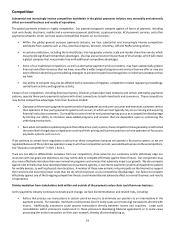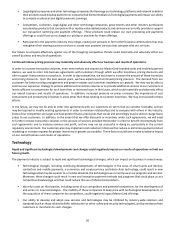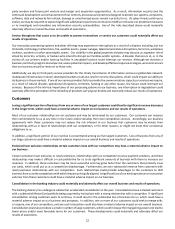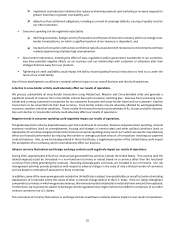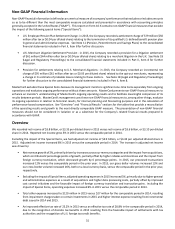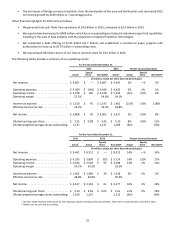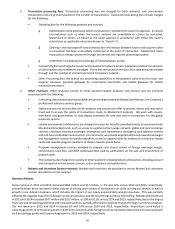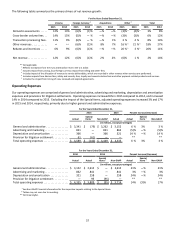MasterCard 2015 Annual Report Download - page 33
Download and view the complete annual report
Please find page 33 of the 2015 MasterCard annual report below. You can navigate through the pages in the report by either clicking on the pages listed below, or by using the keyword search tool below to find specific information within the annual report.27
Moreover, we may spend time and money on acquisitions or projects that do not meet our expectations or increase our revenue.
To the extent we pay the purchase price of any acquisition in cash, it would reduce our cash reserves available to us for other
uses, and to the extent the purchase price is paid with our stock, it could be dilutive to our stockholders. Furthermore, we may
not be able to successfully finance the business following the acquisition as a result of costs of operations, including any litigation
risk which may be inherited from the acquisition.
Any acquisition or entry into a new business could subject us to new regulations with which we would need to comply, and we
could be subject to liability or reputational harm to the extent we cannot meet any such compliance requirements. Our expansion
into new businesses could also result in unanticipated issues which may be difficult to manage. Although we periodically evaluate
potential acquisitions of businesses, products and technologies and anticipate continuing to make these evaluations, we cannot
guarantee that we will be able to execute and integrate any such acquisitions.
Litigation
Liabilities we may incur for any litigation that has been or may be brought against us could materially and adversely affect
our results of operations.
We are a defendant on a number of civil litigations and regulatory proceedings and investigations, including among others, those
alleging violations of competition and antitrust law and those involving intellectual property clams. See Note 18 (Legal and
Regulatory Proceedings) to the consolidated financial statements included in Part II, Item 8 for more details regarding the
allegations contained in these complaints and the status of these proceedings. In the event we are found liable in any material
litigations or proceedings, particularly in the event we may be found liable in a large class-action lawsuit or on the basis of an
antitrust claim entitling the plaintiff to treble damages or under which we were jointly and severally liable, we could be subject
to significant damages, which could have a material adverse impact on our overall business and results of operations.
Limitations on our business resulting from litigation or litigation settlements may materially and adversely affect our overall
business and results of operations.
Certain limitations have been placed on our business in recent years because of litigation and litigation settlements, such as
changes to our no-surcharge rule in the United States. Any future limitations on our business resulting from litigation or litigation
settlements could reduce the volume of business that we do with our customers, which may materially and adversely affect our
overall business and results of operations.
Class A Common Stock and Governance Structure
Provisions in our organizational documents and Delaware law could be considered anti-takeover provisions and have an impact
on change-in-control.
Provisions contained in our amended and restated certificate of incorporation and bylaws and Delaware law could be considered
anti-takeover provisions, including provisions that could delay or prevent entirely a merger or acquisition that our stockholders
consider favorable. These provisions may also discourage acquisition proposals or have the effect of delaying or preventing
entirely a change in control, which could harm our stock price. For example, subject to limited exceptions, our amended and
restated certificate of incorporation prohibits any person from beneficially owning more than 15% of any of the Class A common
stock or any other class or series of our stock with general voting power, or more than 15% of our total voting power. In addition:
• our stockholders are not entitled to the right to cumulate votes in the election of directors;
• our stockholders are not entitled to act by written consent;
• a vote of 80% or more of all of the outstanding shares of our stock then entitled to vote is required for stockholders to
amend any provision of our bylaws; and
• any representative of a competitor of MasterCard or of the Foundation is disqualified from service on our board of
directors.
The Foundation’s substantial stock ownership, and restrictions on its sales, may impact corporate actions or acquisition
proposals favorable to, or favored by, the other public stockholders.
As of February 4, 2016, the Foundation owned 115,446,594 shares of Class A common stock, representing approximately 10.6%
of our general voting power. The Foundation may not sell or otherwise transfer its shares of Class A common stock prior to April




